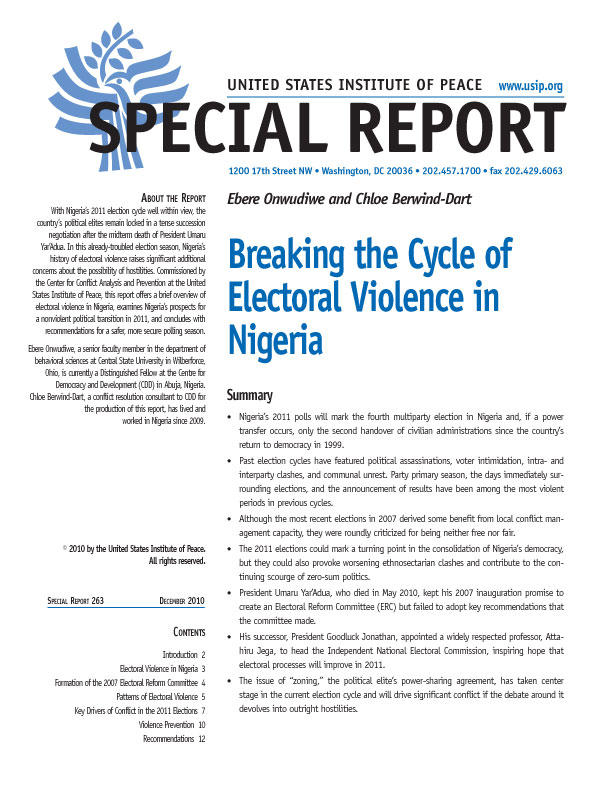Commissioned by the Center for Conflict Analysis and Prevention at the United States Institute of Peace, this report offers a brief overview of electoral violence in Nigeria, examines Nigeria’s prospects for a nonviolent political transition in 2011, and concludes with recommendations for a safer, more secure polling season.

Summary
- Nigeria’s 2011 polls will mark the fourth multiparty election in Nigeria and, if a power transfer occurs, only the second handover of civilian administrations since the country’s return to democracy in 1999.
- Past election cycles have featured political assassinations, voter intimidation, intra- and interparty clashes, and communal unrest. Party primary season, the days immediately surrounding elections, and the announcement of results have been among the most violent periods in previous cycles.
- Although the most recent elections in 2007 derived some benefit from local conflict management capacity, they were roundly criticized for being neither free nor fair.
- The 2011 elections could mark a turning point in the consolidation of Nigeria’s democracy, but they could also provoke worsening ethnosectarian clashes and contribute to the continuing scourge of zero-sum politics.
- President Umaru Yar’Adua, who died in May 2010, kept his 2007 inauguration promise to create an Electoral Reform Committee (ERC) but failed to adopt key recommendations that the committee made.
- His successor, President Goodluck Jonathan, appointed a widely respected professor, Attahiru Jega, to head the Independent National Electoral Commission, inspiring hope that electoral processes will improve in 2011.
- The issue of “zoning,” the political elite’s power-sharing agreement, has taken center stage in the current election cycle and will drive significant conflict if the debate around it devolves into outright hostilities.
- In this unusual election cycle, local and international organizations and Electoral Management Bodies (EMBs) must redouble their efforts both to prevent and resolve conflicts and to promote conflict sensitivity.
- The near term requires an increasingly important role for the judiciary in combating electoral fraud, and the longer term requires the creation of the ERC–recommended Electoral Offenses Commission, which would specialize in the investigation and prosecution of crimes.
- Local agencies and respected community leaders must remain proactive and creative in violence-prevention programming, irrespective of international funding. Established local organizations with preexisting networks are best situated to perform early-warning and conflict management functions.
- High voter turnout and citizen monitoring are vital for ensuring that the 2011 elections in Nigeria are credible and civil.
About the Report
With Nigeria’s 2011 election cycle well within view, the country’s political elites remain locked in a tense succession negotiation after the midterm death of President Umaru Yar’Adua. In this already-troubled election season, Nigeria’s history of electoral violence raises significant additional concerns about the possibility of hostilities. Commissioned by the Center for Conflict Analysis and Prevention at the United States Institute of Peace, this report offers a brief overview of electoral violence in Nigeria, examines Nigeria’s prospects for a nonviolent political transition in 2011, and concludes with recommendations for a safer, more secure polling season.
Ebere Onwudiwe, a senior faculty member in the department of behavioral sciences at Central State University in Wilberforce, Ohio, is currently a Distinguished Fellow at the Centre for Democracy and Development (CDD) in Abuja, Nigeria. Chloe Berwind-Dart, a conflict resolution consultant to CDD for the production of this report, has lived and worked in Nigeria since 2009.